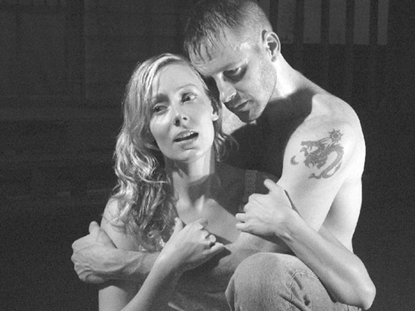By Steven Snyder
“Home Front’s” world premiere at La Mama Experimental Theater couldn’t be more timely. Debuting the same week as a sweeping midterm election, in which the Iraq war was a lightening rod for change, Daniel Algie’s bleak play suggests just how far removed we as a nation remain from the very topic we claim to care most about.
Far away from the fog of the battlefield, Algie’s story takes place entirely on the front porch, and in the front yard, of a rural American homestead. The drama is constructed around the psychological toll war has wrought not just on one soldier but on all those who love this man sent overseas, gun in hand.
Though Algie draws several parallels between “Home Front’s” plot and that of Greek tragedy, in many ways, it’s less a tragedy than a grim eulogy. Or, in war terminology, it’s not so much a story of battle than a survey of the carnage littering the landscape after the battle.
On this ranch, Grandpa (Joseph Jamrog) is reading stories to his grandkids — an improbably optimistic opening given the heartache that is about to be unleashed. As the kids prepare to go to bed, their mom (Christy Pusz) appears, bewildered and disoriented. She rushes to Grandpa and tells him that she’s just spoken with Harrison (Fletcher McTaggart) — well, not spoken so much as heard her long-lost husband sobbing on the other end of the telephone. A Vietnam soldier, Harrison has been gone for seven years, five more than one of his closest friends who moved back home just down the street ages ago, and now she can barely contain her giddiness.
Grandpa, for his part, isn’t impressed. Why obsess over a phone call, he says, when these children are right in front of her? Would it have killed her to at least kiss them goodnight?
It’s an innocent observation, until we realize his note of concern is based on months and years of neglect. Harrison’s wife has been shattered mentally by the loss of the man she loves most, and as the two erupt into a verbal sparring match, we realize that she has been forced to check herself into psychiatric wards for depression, and is now concerned about the possibility of losing her children if she has another breakdown. Her brain’s defense mechanism to the pain of losing a lover at war is to shut down, much like Grandpa’s defense seems to be to disavow that the soldier is his child at all. In talking about his deceased wife, he implies that she had several affairs and that Harrison wasn’t even his son.
Together, they both seem to be suffering, dreaming of the day that Harrison will return and set all right — until the day he appears in the front yard, home from the war, and we realize it’s not that simple. Harrison’s kids are afraid of him, his father is preoccupied with talking about the torture his son suffered through, and his wife tries desperately to push her depression away by wrapping herself in his arms. Harrison, in his own right, seems to be struggling through the shock of returning home, his many waking nightmares about war sending him into one dizzy spell after another. Home sweet home, it seems, is just an illusion.
Unquestionably, “Home Front” is a bleak story. It asks its cast to relentlessly straddle the themes of longing, loneliness and outright despair, and its actors are ready to face the challenge head-on. Jamrog avoids turning his old man into a loveable old grouch, instead taking his character to the very brink of unlikability. Even through the play’s tragic final act, Grandpa remains sour and skeptical to the core.
Pusz, as Harrison’s wife, is thoroughly believable as a woman at the edge of sanity. And this is only enhanced after her husband returns home, as she balances the happiness of a relieved wife with the desperation of a broken woman clinging to her man in the hopes that now, surely, everything must turn out alright.
And Harrison (McTaggart), as the returning soldier, fights his way through a grueling, draining performance. As he slowly tells his wife stories about how he was tortured, switching from relief to rage to remorse in a clear bout with post-traumatic stress syndrome, the power of story’s shocking conclusion rests solely in Harrison’s hands and within the pain to be seen on his face.
In a culture that doesn’t look at the caskets returning home from war, or discuss the spirits of the men who have now been forced to serve two or three tours of duty, this is the face we haven’t seen. As debates about timetables, “victory” and insurgents have filled the headlines, what we’ve lost sight of are the individual stories of our men and women, struggling against increasingly overwhelming odds.
“Home Front” may be set around another war, but it’s preoccupied with the same families, hearts and minds being torn apart today. Wars, weapons and battle tactics may change but, as Algie so usefully reminds us, the collateral damage always remains the same. No, it’s not groundbreaking, but it’s amazing how we forget even the simplest lessons.






































